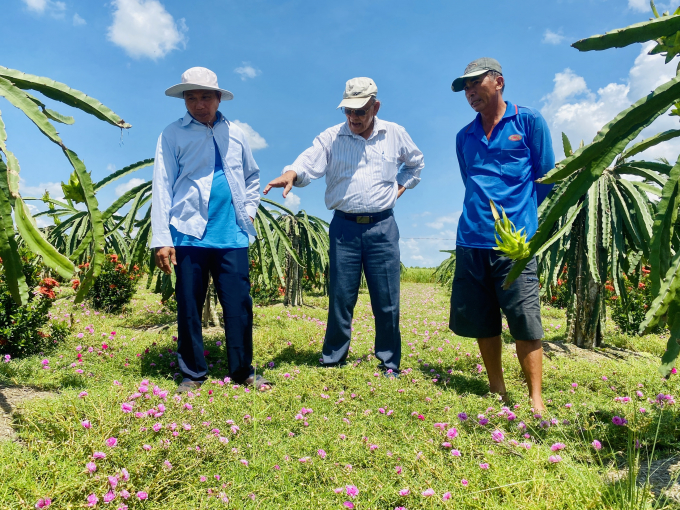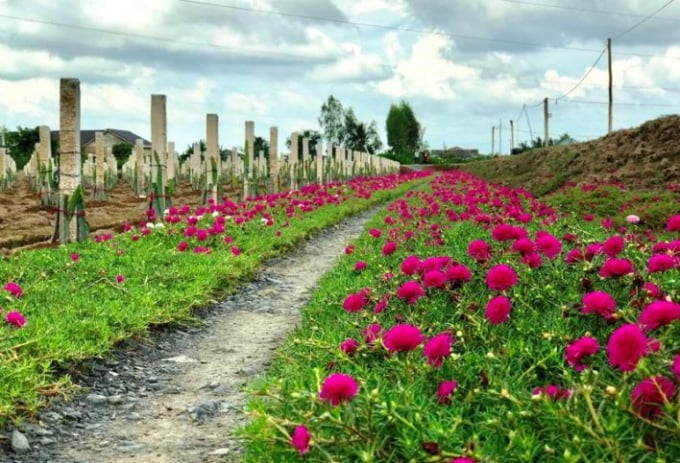May 28, 2025 | 04:04 GMT +7
May 28, 2025 | 04:04 GMT +7
Hotline: 0913.378.918
May 28, 2025 | 04:04 GMT +7
Hotline: 0913.378.918

Prof Nguyen Tho ( centre) visits and avaluates the effects of growing Portulaca grandiflora in green dragon fruit farm in Long An province. Photo: Thanh Tam.
Abusing chemical fertilisers and pesticides in agriculture production resulted in soil degradation which then caused diseases for crops, said Nguyen Tho, vice president of Vietnam Plant Protection Association.
Tho said that a major cause of the soil-relating diseases was the strong growth of harmful microorganisms in the soil.
“Adding organic matters to the soil is a top solution to prevent and control plant disease,” he said.
When chemical fertilisers and pesticides were used too much and organic fertilisers were hardly used, the soil would be degraded.
Harmful microorganisms could take food from both soil and plants, he said, adding that if soil fertility declined, the harmful microorganisms would take food from plants and weaken the plants.
The thrive of harmful microorganisms in soil caused diseases for crops such as citrus greening disease or root rot disease, he said.
He added that when pathogens lived deep underground, it was difficult to control.

Portulaca grandiflora is grown in green dragon fruit farm. Photo: Thuy Nguyen.
“If chemical fertilisers are continued overusing, we would never prevent and manage plant diseases sustainably,” he said.
Prof Tho said that it was necessary to return or add organic matters to the soil.
For examples, in the southern province of Long An, farmers grew Portulaca grandiflora in green dragon fruit farms.
With the flower, farmers used fewer pesticides, fertilisers or plant protection products. Moreover, green dragon fruit plants were seen to grow well.
Even during droughts or saltwater intrusion, the green dragon fruits with Portulaca grandiflora below were still growing well, Tho said.
Growing wild peanut to cover soil was also another effective measure.
In Di Linh District of the Central Highland province of Lam Dong, a local farmer grew wild peanut under his coffee trees.
Scientists from the Netherlands, who are studying about sustainable agriculture environment, for many times, took soil samples from the farm for their analysis.
They found that soil in that farm was much more productive and fertile than those in other coffee areas which are without wild peanut.
During droughts, thanks to the wild peanut covering the soil, it was no need to water the coffee.
The mealybug did not climb up the coffee trees, but hid under the canopy of the wild peanuts, so the coffee was not harmed by it.
“It is very necessary to encourage farmers to apply organic farming methods in agriculture production,” Tho said.
During the past time, when it came to organic farming in Viet Nam, organic products were paid much attention, he said.
“It’s great when organic farming produces organic products but it is not enough,” Tho said.
“More importantly, organic farming will increase organic matters, return the organic matters to the soil. Thus, it helps increase soil fertility and ensure biodiversity in soil,” he said.
The agriculture professor said that generally, farmers knew how to return organic matters to the soil.
“The thing that matters here is communication. Authorities need to enhance communication about sustainable farming through the network of agriculture promotion centres across the country,” he said.
In addition, it was a must to limit the use of chemical products in cultivation.
If using such products, it was necessary to use them properly and products that are friendly to the environment should be given priority, Tho said.
The use of probiotics in agriculture has been emerging across the world to increase soil fertility.
Probiotic is used in composting organic fertilisers. Probiotic is also watered on agriculture waste to speed up their decomposition process.
Probiotics are available in human and animals, helping people and animals increase immunity and fight against disease-causing microorganisms.
When human and animal discharged probiotic into the environment, the probiotic would add nutrients to the soil and help create an ecosystem balance in which useful microorganisms and antagonistic microorganisms could beat harmful microorganisms.
To crops, probiotic was considered “a midwife” that brought food to the plants easily, thus help improve the plants’ immunity system. Further, probiotics from food went back to the human body, Tho said, adding that probiotic underwent a circulation.
AAuthor: Thanh Son. Translated by Hien Anh. Edited by Đức Huy.
/2025/05/25/4127-3-073637_820.jpg)
(VAN) Thanks to the promotion from an FAO-implemented project, vegetable production in greenhouses in Moc Chau has seen strong development, from 1.5 hectares in 2021 to nearly 50 hectares in 2024.

(VAN) FAO has recently supported USD 140,000 to implement the project 'Risk mitigation human-animal interface risks through disease control initiatives in pig farming.'

(VAN) The People's Committee of Tra Vinh province has approved an adjustment to the investment policy for the Green Hydrogen Plant project, increasing its area to approximately 52.76 hectares.
![Reducing emissions from rice fields: [2] Farmers’ commitment to the soil](https://t.ex-cdn.com/nongnghiepmoitruong.vn/608w/files/news/2025/05/05/dsc08881jpg-nongnghiep-140632.jpg)
(VAN) Clean rice cultivation model in Thuong Tan commune, Bac Tan Uyen district, is assisting local residents in achieving sustainable agriculture by substantially reducing costs, increasing productivity, and protecting the environment.

(VAN) At the conference to disseminate Resolution No. 68, AgriS introduced its digital agricultural ecosystem and reaffirmed its commitment to accompanying the Government in promoting private sector development and sustainable agriculture.

(VAN) 'Blue Ocean - Blue Foods' initiative is designed to restore marine ecosystems and establish sustainable livelihoods for local communities by cultivating a minimum of 1,000 hectares of cottonii seaweed in the first three years.
/2025/05/21/4642-3-112707_603.jpg)
(VAN) The V-SCOPE project has made direct contributions to three out of six pillars of the Comprehensive Strategic Partnership between Vietnam and Australia.